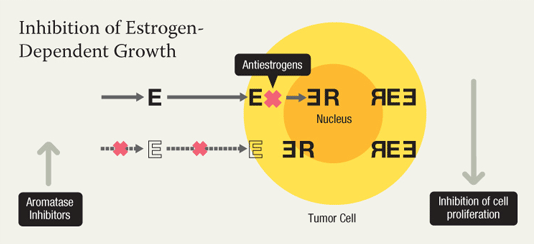
The Trials and Tested Agents of Breast Cancer Chemoprevention
Several phase III, randomized breast cancer chemoprevention trials have been completed and most have reported long-term follow-up data. Two other large trials are underway, one in England and one in Canada. The following is a brief primer on some of these trials.
Completed Trials
Royal Marsden - Randomized high-risk women to tamoxifen or placebo for 8 years. Initial results showed no decrease in breast cancer risk, but recent follow-up data showed a 39-percent reduction in ER-positive invasive breast cancer.
IBIS-I - Randomized high-risk women to tamoxifen or placebo for 5 years. Initial results showed a 31-percent reduced risk of ER-positive invasive breast cancer; recent follow-up data showed a 34-percent reduction.
BCPT - The first U.S.-based breast cancer chemoprevention clinical trial. Initial results showed a 49-percent reduction in breast cancer among women on tamoxifen, with an increased risk of endometrial cancer and blood clots. Longer-term follow-up revealed a 43-percent risk reduction.
STAR - Compared tamoxifen to the anti-osteoporosis drug raloxifene. Raloxifene was as effective as tamoxifen at reducing breast cancer risk and was associated with fewer serious adverse effects. Tamoxifen was more effective at reducing the risk of noninvasive breast cancers.
RUTH - Randomized approximately 10,000 postmenopausal women to raloxifene or placebo. Raloxifene was associated with a reduced risk of invasive, primarily ER-positive breast cancer, but also increased the risk of fatal strokes and blood clots.
MORE/CORE - Randomized participants to 60 mg/day of raloxifene or placebo. Over 8 years there was a 66-percent reduction in risk of invasive breast cancer (primarily ER-positive). Raloxifene use was associated with an increased risk of blood clots.
Ongoing Trials
IBIS-II - Launched in 2004 in the United Kingdom, IBIS-II will randomize 6,000 postmenopausal, high-risk women to the aromatase inhibitor (AI) anastrozole or placebo. A parallel trial is comparing anastrozole to tamoxifen in 4,000 women who have had a precancerous lesion in their breast removed.
MAP.3 - Launched last year by NCI-Canada, this trial will randomize high-risk women to placebo or to the AI exemestane.
 Two drugs - Two mechanisms of action
Two drugs - Two mechanisms of action
Antiestrogens such as tamoxifen bind to the estrogen receptors on breast cancer cells, preventing the hormone from binding to the cell. This keeps the cell from growing and proliferating. Aromatase inhibitors such as anastrozole and letrozole inhibit estrogen production by the body. This can slow or stop the growth of breast cancer cells that need estrogen to grow. Both types of drugs are being tested as ways to reduce breast cancer risk. |